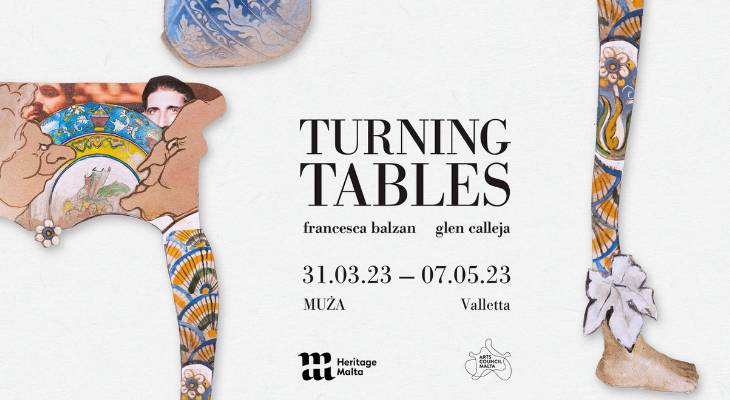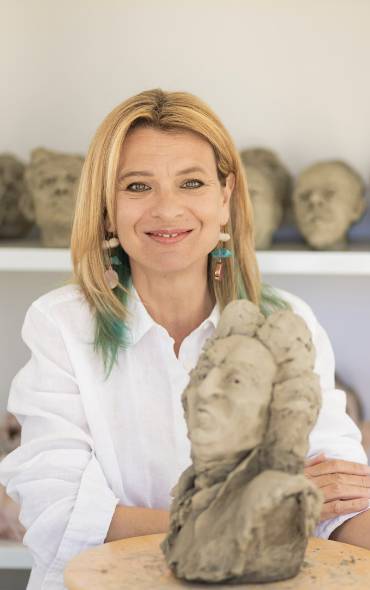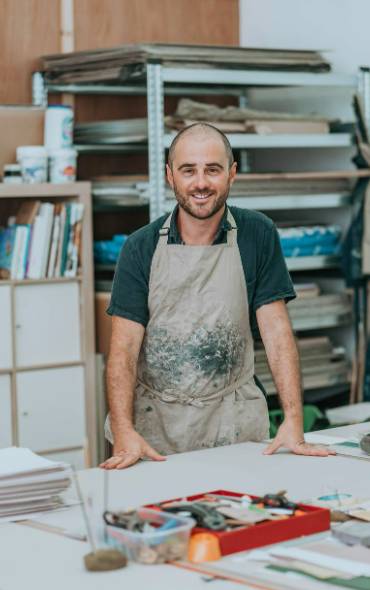Turning Tables by Francesca Balzan & Glen Calleja: A fresh perspective on Muża's historic artworks
MUŻA – the national museum of art – has recently launched an extraordinary art exhibition Turning Tables, by local artists Francesca Balzan and Glen Calleja, and supported by Arts Council Malta. As they shake the dust off historic relics held inside MUŻA’s reserve collection, Francesca and Glen aim to disrupt and disturb the thoughts behind these rarely seen artworks and the community surrounding them. The exhibition walks you through their reactions to these pieces in artforms that take on myriad mediums.
This multi-year project was inspired by the room wherein these artworks lie – the Camerone – which served as the dining room for the Knights of the Auberge d’Italie (the stunning edifice that is home to the museum) many moons ago. Recognising the significance of tables within these walls, Francesca and Glen experimented with flipping the script: confronting their own ideas and resolving them in a ground-breaking exhibition.

The Artists Behind The Exhibition
Inspired by archival research and working mostly with clay, Francesca is a sculptor with a background in art history and curation. While ‘clay fleshes out the stories’, archives serve as the muse, and written narratives accompany her work as she brings new stories to life. Glen, on the other hand, works primarily with books, paper, and text. As Francesca describes, ‘for him everything starts and ends in paper’. He is the man behind www.kotbacalleja.net – a bindery and producer of paper products – and is the creative director for Studio Solipsis, organising several cultural events. Besides executing enlightening projects for over 20 years, Glen has written and edited a number of books.

Inigo Taylor
Francesca and Glen tapped into MUŻA’s little-explored reserve collection, which is typically limited to bona fide researchers. The pieces, dating back to the 17th and 18th centuries, alongside some sculptures from the early 20th century, represent ‘a treasure trove that the general public is not familiar with’, marking it as a collection that ‘is ripe for discovery’ for citizens and artists alike. Inspired by these artworks, Francesca and Glen strived to reframe Maltese heritage in order to pose questions, like why certain artworks are placed in storage, or who calls the shots when it comes to which narratives are presented to the population. What stories can these ‘forgotten objects’ tell us? Do they hold any intricacies or secrets? Indeed, Francesca curiously asks: ‘How does one present “old” objects in a new context to make them playful, accessible, engaging, and relevant to contemporary audiences?’

Lindsey Bahia
Recognising that chairs play an integral part in the table setting, yet slightly shifting the narrative, the artists reached out to the families of modern artists, to loan their workshop chairs and place them in conversation with one another. As Francesca and Glen explain, these iconic chairs belong to a wide array of protagonists: ‘from the founding father of the museum, Vincenzo Bonello, to the anonymous art student representing generations of students’, all to question: who gets a seat at the table? How do their artworks relate to each other and to the map of Maltese art? Can the artists be significant on their own, or must they be considered in the context of those that came before and after them?
Living in an archipelago bursting with history, it comes as no surprise that these artists chose to not just look back, but to reflect on the past that has shaped us, and react to it with art. Through contemporary language, the exhibition anticipates connecting with present audiences, prompting them to question this collective identity. As the artists explain, ‘Our past is the key to our identity. We need to examine it, question it, and perhaps debunk myths of how the past was better than the present.’
With the merging of antique artworks and fresh perspectives, Francesca, and Glen hope for ‘the public to be challenged by this seemingly unorthodox display’: to view these pieces ‘in a new light, and to pose questions’ about them and national patrimony.
The contemporary art exhibition, Turning Tables, is open for viewing until 7th May 2023, at MUŻA in Valletta. You can follow the artists on Instagram @franbalzansculpture and @glencalleja.